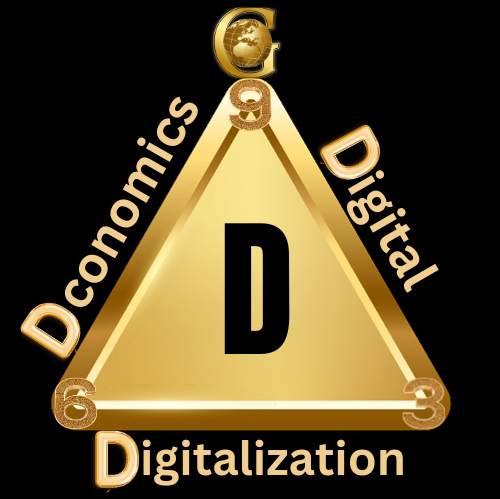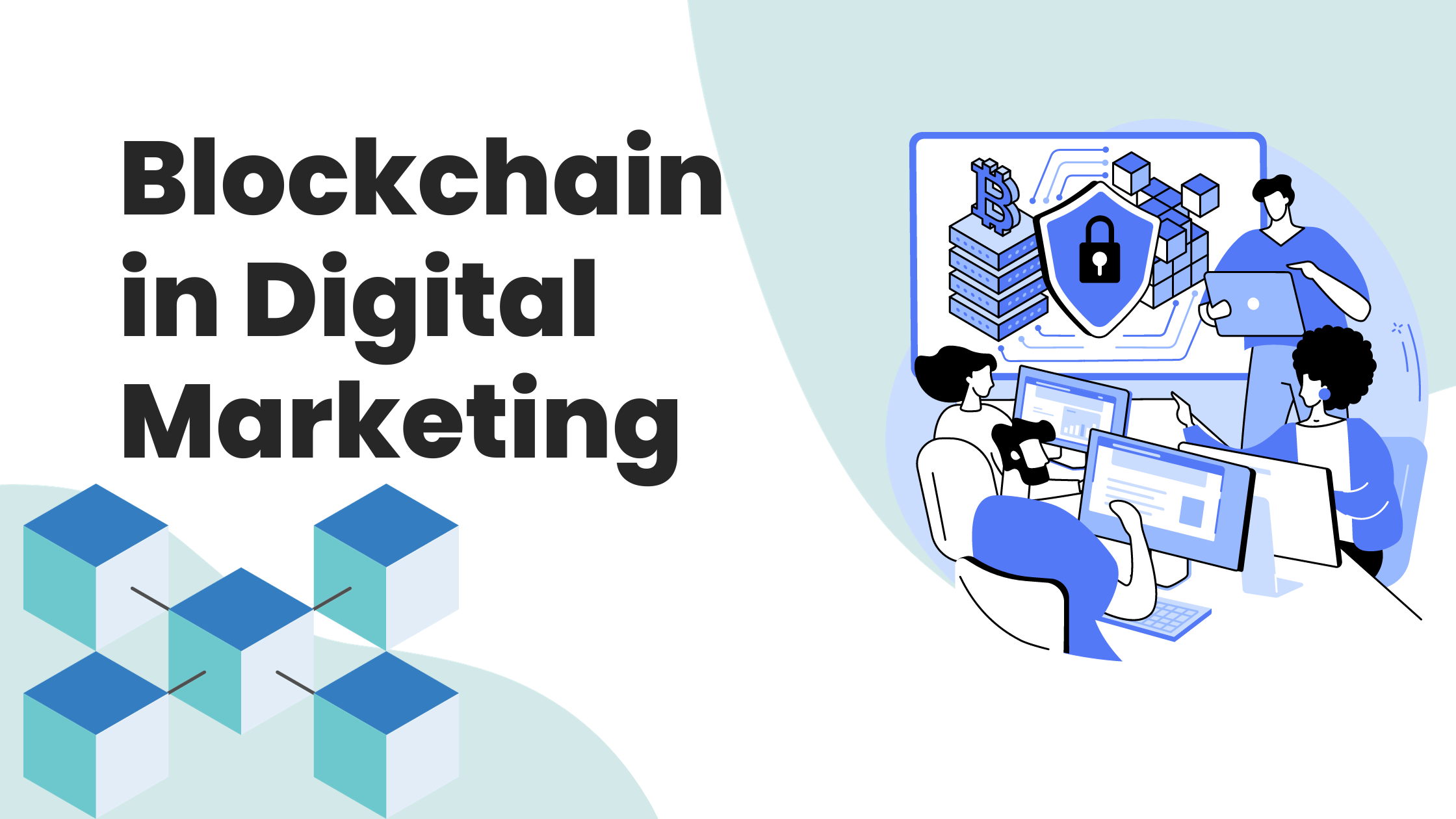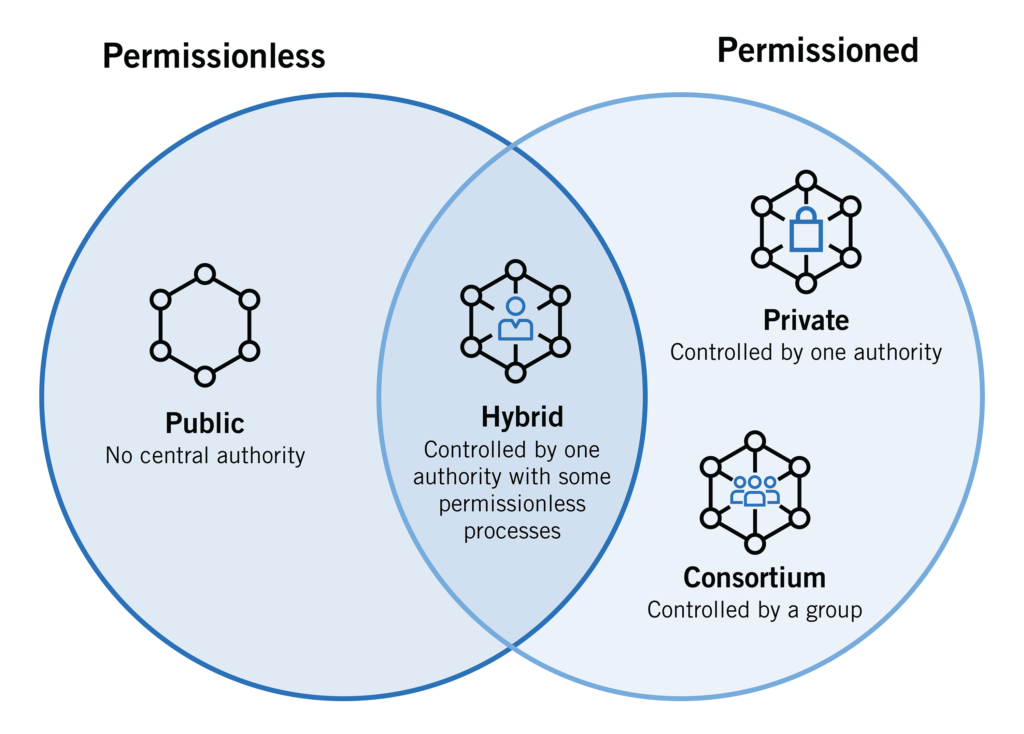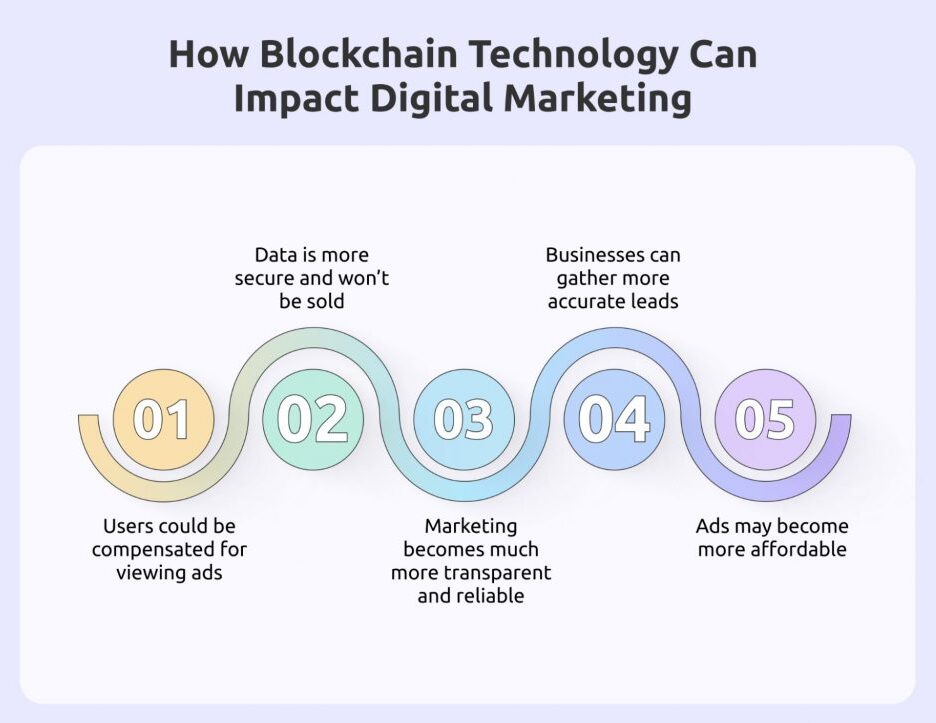Blockchain in Digital Marketing
Contents
- Blockchain in Digital Marketing
- Use Cases of Blockchain in Digital Marketing
- 1. Ad Fraud Prevention
- 2. Enhanced Data Privacy
- 3. Improved Targeting and Personalization
- 4. Authenticating Influencer Marketing
- 5. Content Monetization
- 6. Loyalty Programs
- 7. Transparency and Trust
- 8. Smart Contracts
- 9. Supply Chain Verification
- 10. Token-Based Rewards
- 11. Content Authentication
- 12. Affiliate Marketing
- 13. Ad Targeting and Privacy
- 14. Marketplace for Digital Assets
- Advantages of Using Blockchain in Digital Marketing
- Which Architectural types of Blockchain in Digital Marketing?
- Using Blockchain in Digital Marketing (Influencer Marketing):
- Blockchain Architecture Considerations for Influencer Marketing
- Use Cases of Blockchain in Digital Marketing
Use Cases of Blockchain in Digital Marketing
Blockchain technology has the potential to revolutionize the digital marketing industry by providing increased transparency, security, and efficiency. Here are some use cases where we can use blockchain in digital marketing:
1. Ad Fraud Prevention
Blockchain in Digital marketing can help combat ad fraud by creating a transparent and tamper-proof record of ad impressions, clicks, and conversions. Smart contracts can be used to verify and authenticate ad transactions, ensuring that advertisers are paying for legitimate, verified interactions.
2. Enhanced Data Privacy
Blockchain can provide individuals with control over their personal data. Users can consent to share their data with advertisers and receive fair compensation in the form of tokens or cryptocurrencies. Blockchain in Digital marketing may empower users and address privacy concerns in digital marketing.
3. Improved Targeting and Personalization
Blockchain can enable a decentralized identity management system. Users can maintain their digital identities across different platforms and share relevant information with advertisers. Blockchain in Digital marketing can lead to more accurate targeting and personalized marketing campaigns.
4. Authenticating Influencer Marketing
Blockchain in Digital marketing can verify the authenticity and transparency of influencer marketing campaigns. It can track engagement, verify followers, and ensure that influencers deliver the promised results. Using Blockchain in Digital marketing builds trust between brands, influencers, and consumers.
5. Content Monetization
Using Blockchain in Digital marketing, Blockchain-based platforms can facilitate direct peer-to-peer content transactions, enabling creators to monetize their work without intermediaries. Smart contracts can automate payment processes based on predetermined conditions, ensuring fair compensation for content creators.
6. Loyalty Programs
Using Blockchain in Digital marketing can enhance loyalty programs by creating tokenized rewards that users can securely store and redeem across multiple platforms. This eliminates the need for complex systems and allows for seamless redemption and transfer of loyalty points.
7. Transparency and Trust
Blockchain in Digital marketing can be used to create transparent and immutable ledgers for digital advertising campaigns. This means that all stakeholders, including advertisers, publishers, and consumers, can verify transactions and campaign performance, reducing fraud and ensuring trust.
8. Smart Contracts
Blockchain in Digital marketing can implement Smart contracts which can automate agreements between advertisers and publishers. For instance, payments can be automatically released when predefined criteria are met, reducing delays and disputes.
9. Supply Chain Verification
Blockchain in Digital marketing and extended to it’s use influencer marketing, brands can use blockchain to verify the authenticity of an influencer’s follower count, engagement, and demographic data. This ensures that advertisers are getting what they pay for.
To know more about Influencer Marketing : CLICK HERE
10. Token-Based Rewards
Blockchain in Digital marketing can enable loyalty programs and reward systems that use tokens or cryptocurrencies, enhancing customer engagement and retention.
11. Content Authentication
Using Blockchain in Digital marketing, Content creators can timestamp their work on a blockchain to prove ownership and protect against plagiarism.
12. Affiliate Marketing
Blockchain in Digital marketing can ensure fair and transparent commission payouts in affiliate marketing programs.
13. Ad Targeting and Privacy
Blockchain in Digital marketing can enable users to have more control over their data and the ads they see. Users can opt to share their data with advertisers in exchange for tokens or rewards.
14. Marketplace for Digital Assets
Blockchain in Digital marketing can be used to create marketplaces for buying and selling digital assets like ad space or marketing data, reducing the role of intermediaries and associated fees.
Advantages of Using Blockchain in Digital Marketing
As a Digital Marketing consultant, using Blockchain in digital marketing can provide growth in your business and can provide several advantages:
1. Increased Trust and Transparency
When we use Blockchain in Digital marketing, Blockchain’s decentralized nature fosters trust among clients and partners. It provides transparent and immutable records, instilling confidence in the accuracy and authenticity of your marketing efforts.
2. Enhanced Data Security
Blockchain’s cryptographic algorithms and distributed storage make it highly secure. By leveraging blockchain in Digital marketing, you can offer clients better data protection and privacy, mitigating concerns related to data breaches and unauthorized access.
3. Competitive Differentiation
Integrating Blockchain in Digital marketing services sets you apart from competitors. It demonstrates your commitment to innovation, data integrity, and delivering cutting-edge solutions to clients.
4. Cost Savings and Efficiency
Blockchain automates processes, eliminates intermediaries, and reduces administrative costs. Blockchain in Digital marketing can improve the efficiency of your operations and lead to cost savings, allowing you to offer competitive pricing to clients.
5. Attracting Tech-Savvy Clients
Many businesses are actively seeking digital marketing consultants who can harness emerging technologies like Blockchain in Digital marketing. By demonstrating your expertise in this area, you can attract clients who value innovation and forward-thinking strategies.
6. Data Protection
Using blockchain in digital marketing, Clients are increasingly concerned about data privacy. You can offer solutions that help clients protect customer data and comply with data privacy regulations like GDPR.
7. Fraud Prevention
Using blockchain in digital marketing, You can help clients reduce ad fraud and ensure that their marketing budgets are used effectively, which can lead to cost savings and improved ROI.
It’s important to note that adoption of blockchain in digital marketing is still in its early stages. However, as the technology matures and gains wider acceptance, embracing it can position you as a thought leader and pioneer in the digital marketing industry.
However, it’s essential to note that implementing blockchain in digital marketing solutions can be complex and may require a deep understanding of both digital marketing and blockchain technology. Stay informed about blockchain developments, network with industry professionals, and educate yourself on the practical applications of blockchain in digital marketing. This will enable you to leverage the technology effectively and stay ahead of the curve.
Additionally, the adoption of blockchain in the digital marketing industry is still evolving, so staying updated on the latest trends and developments is crucial.
Which Architectural types of Blockchain in Digital Marketing?
What Various factors are responsible to decide upon the type of such architecture of blockchain in Digital marketing to be implemented?
The choice of blockchain architecture in digital marketing depends on several factors, including the specific use case, the level of decentralization required, data privacy concerns, scalability requirements, and the target audience. Here are some key considerations and factors responsible for deciding the type of blockchain architecture:
1. Use Case
- Public Blockchain: If transparency and open access to data are critical, a public blockchain like Ethereum or Binance Smart Chain may be suitable. Public blockchains are often used for applications where multiple parties need to trust a neutral, decentralized network.
- Permissioned Blockchain: For use cases that involve a consortium of known participants or require more control over access and governance, a permissioned blockchain (e.g., Hyperledger Fabric) may be preferred.
- Private Blockchain: When an organization wants full control over the blockchain network and data, a private blockchain is the choice. It’s ideal for internal processes and situations where trust is already established.
2. Data Privacy
- Public Blockchain: Public blockchains provide a high level of transparency but may not be suitable for applications where data privacy is a primary concern since all data is visible to anyone. However, privacy-enhancing technologies like zero-knowledge proofs are being developed to address this limitation.
- Permissioned Blockchain: In a permissioned blockchain, participants have more control over who can access data, making it a better choice for scenarios where data privacy is a priority.
- Private Blockchain: Private blockchains offer the highest level of data privacy because they are typically restricted to a single organization. This is ideal when sensitive data must be protected.
3. Decentralization
- Public Blockchain: Public blockchains are the most decentralized, relying on a global network of nodes for validation. They are suitable when trust needs to be distributed and censorship resistance is vital.
- Permissioned Blockchain: Permissioned blockchains provide a degree of decentralization but are controlled by a select group of participants. They are useful when trust among known entities is established, and governance control is essential.
- Private Blockchain: Private blockchains are centralized by design, making them suitable for scenarios where complete control over the network is required.
4. Scalability
- Public Blockchain: Scalability can be a concern on public blockchains due to the large number of participants and transactions. However, Layer 2 solutions and sharding are being developed to improve scalability.
- Permissioned Blockchain: Permissioned blockchains can be more scalable than public blockchains since they have fewer participants and can be optimized for specific use cases.
- Private Blockchain: Private blockchains are often highly scalable because they are designed for a single organization’s needs, allowing for greater control over network performance.
5. Target Audience
- Public Blockchain: If the target audience includes a broad range of participants, such as consumers or businesses from different sectors, a public blockchain can provide the necessary inclusivity.
- Permissioned Blockchain: When the audience consists of known entities, partners, or industry-specific participants, a permissioned blockchain can provide a controlled environment.
- Private Blockchain: Private blockchains are primarily suited for internal processes within an organization.
6. Compliance and Regulation
- Public and Permissioned Blockchain: Consider the regulatory environment in your region. Some industries or regions may require specific compliance measures, which can influence your choice of blockchain architecture.
7. Development and Maintenance Costs
- Public Blockchain: Building and maintaining applications on public blockchains may involve fees and can be more costly than permissioned or private solutions.
- Permissioned and Private Blockchain: These architectures may require less ongoing maintenance and may offer cost savings in the long run for certain use cases.
Ultimately, the choice of blockchain architecture should align with the specific goals, requirements, and constraints of your digital marketing project. It’s essential to carefully assess these factors and consider the trade-offs between decentralization, data privacy, scalability, and control before making a decision. In some cases, hybrid solutions that combine aspects of different architectures may be the most suitable choice.
Use of Blockchain Technology in Healthcare Sector : Read More
Using Blockchain in Digital Marketing (Influencer Marketing):
Using blockchain in digital marketing to authenticate influencers involves creating a transparent and tamper-proof system for verifying an influencer’s metrics, such as follower count, engagement, and demographic data. Below is a detailed explanation of how this can be practically implemented, along with considerations for the type of blockchain architecture to use:
1. Data Collection and Verification
- Collecting Data: Initially, the influencer’s data is collected, including their social media posts, follower count, engagement metrics, and demographic data.
- Timestamping: Using blockchain in digital marketing, this data is timestamped on a blockchain, ensuring that it’s immutable and can be traced back to a specific point in time. Timestamping can be done using a digital signature or a hash of the data.
2. Oracle or External Data Feeds
- External Verification: Using blockchain in digital marketing, to ensure the accuracy of data, external oracles or data feeds can be used. These sources can independently verify the influencer’s metrics and report back to the blockchain. For example, data from social media platforms can be integrated through APIs.
3. Smart Contracts
- Creation of Smart Contracts: While using Blockchain in digital marketing, Smart contracts are created on the blockchain to define the terms of the influencer marketing campaign. These contracts can include conditions related to metrics, payment, and reporting.
- Automated Verification: While using Blockchain in digital marketing, Smart contracts can automatically trigger verification processes based on predefined criteria. For instance, once a campaign is live, the smart contract can periodically check the influencer’s metrics against the data collected and verified by external oracles.
4. Verification Process
- Cross-Checking Data: While using Blockchain in digital marketing, the blockchain system compares the influencer’s self-reported metrics with the independently verified metrics. Discrepancies trigger alerts or actions.
- Consensus Mechanism: While using Blockchain in digital marketing, depending on the chosen blockchain architecture, a consensus mechanism (e.g., proof-of-work, proof-of-stake) ensures that the data is valid and that discrepancies are addressed.
5. Reporting and Transparency
- Real-Time Reporting: The results of the verification process are made available in real-time to all stakeholders involved in the marketing campaign, including the advertiser and the influencer.
- Transparency: The blockchain ledger is transparent, allowing anyone to audit the influencer’s performance and metrics, ensuring trust and accountability.
Blockchain Architecture Considerations for Influencer Marketing
The choice of blockchain architecture depends on various factors:
Public Blockchain
Public blockchains like Ethereum offer high levels of transparency and security. However, they may not be suitable for influencer marketing where data privacy is a concern, as all data on public blockchains is visible to anyone.
Permissioned Blockchain
A permissioned blockchain restricts access to verified participants, providing more control over who can validate transactions and access data. This is a good choice if you want to balance transparency with data privacy.
Private Blockchain
Private blockchains are fully controlled by a single entity, making them suitable for use cases where complete control over data is necessary. However, they sacrifice some of the decentralization and transparency of public and permissioned blockchains.
In the case of influencer marketing, a permissioned blockchain may be a suitable choice. It offers a balance between transparency and data privacy, ensuring that only trusted parties can access and validate data. This can help protect influencers’ sensitive data while providing transparency to advertisers.
Ultimately, the success of using blockchain for influencer marketing authentication depends on the willingness of all parties involved to participate in such a system and the accuracy of the data sources and verification mechanisms used.

Consultant & Advisor – Blockchain Projects, Cryptos Launch & Investments, Strategic Partnerships, E-Commerce projects worldwide
* Blockchain Projects: Logistics, Finance, Supply Chain Management, Commodities, Education, Hospitality, AI & IOT solutions, Web3 solutions
* Cryptocurrency Account Management & Investments Strategies
* Strategic Partnerships, Projects Valuations for new & old projects
* Crypto Projects: ICOs, IDOs, IEOs, Listings
* Social Media & Digital Marketing, Community Development



